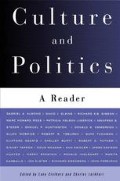Abstract
For Huntington, American society is intrinsically conflictual. His reason for thinking so is not the presence of antagonistic social classes, but the incompatibility between what he calls the “American creed” (a political culture of antistatist values including liberty, equality of opportunity, individualism, democracy, constitutionalism and limited local government) and the requirements of running a society. Coping with the various historical contingencies that confront the United States from abroad (e.g., the Nazi challenge) and within (e.g., disability and aging in an increasingly urban society of nuclear households) routinely produces actions destructive of the values of this antistatist American political culture, particularly a large, more active (e.g., large standing military forces and social security) national government. These practical challenges simply require the coping mechanisms (institutions) of a more hierarchical political culture. This creates what Huntington calls the “IvI gap”—a tension between American ideals (the first “I”) and the institutions (the second “I”) that are necessary to practice modern government. As a consequence of this IvI gap, the United States experiences roughly sixty-year cycles of “creedal passion” involving attacks on authority (hierarchy) in general and central political authority in particular designed to bring political life back into conformance with creedal values. Yet life inevitably returns to hierarchical practices that violate these values. In the pages selected here Huntington provides a brief description of this pattern in terms of a four-stage cycle: moralism, cynicism, complacency, and finally hypocrisy that breeds a return to moralism.
Access this chapter
Tax calculation will be finalised at checkout
Purchases are for personal use only
Preview
Unable to display preview. Download preview PDF.
References
Albert, E. 1963. Conflict and change in American values: A culture-historical approach. Ethics 74 (October).
Blythe, R. 1966. Introduction. Emma by Jane Austen. Harmondsworth: Penguin Books.
Devine, D. 1972. The political culture of the United States. Boston: Little, Brown.
Emerson, R. W. 1870. Prose works. Boston: Fields, Osgood & Co.
Huber, J., and W. Form. 1973. Income and ideology. New York: The Free Press.
Jarros, D., H. Hirsch, and F. Fleron, Jr. 1968. The malevolent leader: Political socialization in American subculture. American Political Science Review 62 (June).
Kristol, I. 1972. On the democratic ideal in America. New York: Harper & Row.
Lipset, S. M. 1971. Youth and politics. In Contemporary social problems, 3d ed., edited by R. Merton and R. Nisbet. New York: Harcourt Brace Jovanovich.
McCloskey, H. 1964. Consensus and ideology in American politics. American Political Science Review 58 (June).
Myrdal, G. 1944. An American dilemma. New York: Harper & Row.
Prothro, J. W. and C. Grigg. 1960. Fundamental principles of democracy: Bases of agreement and disagreement. Journal of Politics 22 (February): 284–291.
Samson, L. 1932. The American mind. New York: Jonathan Cape and Harrison Smith.
Santayana, G. 1956. Character and opinion in the United States. Garden City, NY: Doubleday Anchor.
Shklar, J. 1979. Let us not be hypocritical. Daedalus 108 (Summer).
Stimson, H. and M. Bundy. 1947. On active service in peace and war. New York: Harper & Bros.
Stouffer, 1955. Communism, conformity and civil liberties. Garden City, NY: Doubleday.
Williams, R. 1951. American society. New York: Knopf.
Zajonc, R. 1968. Thinking: Cognitive organization and processes. In International encyclopedia of the social sciences, ed. David L. Sills. New York: Macmillan Co. and Free Press.
Editor information
Copyright information
© 2000 Lane Crothers and Charles Lockhart
About this chapter
Cite this chapter
Huntington, S.P. (2000). Patterns of Response. In: Crothers, L., Lockhart, C. (eds) Culture and Politics. Palgrave Macmillan, New York. https://doi.org/10.1007/978-1-349-62965-7_19
Download citation
DOI: https://doi.org/10.1007/978-1-349-62965-7_19
Publisher Name: Palgrave Macmillan, New York
Print ISBN: 978-0-312-23300-6
Online ISBN: 978-1-349-62965-7
eBook Packages: Palgrave Political & Intern. Studies CollectionPolitical Science and International Studies (R0)

